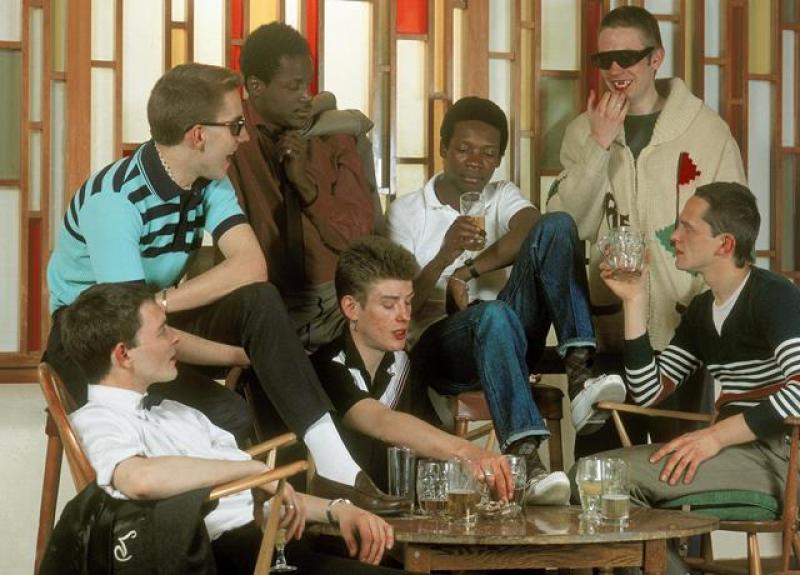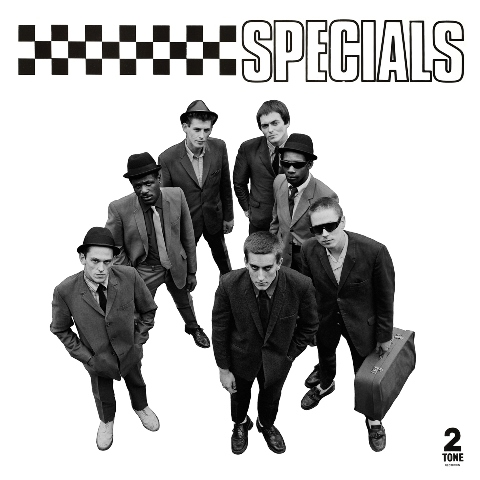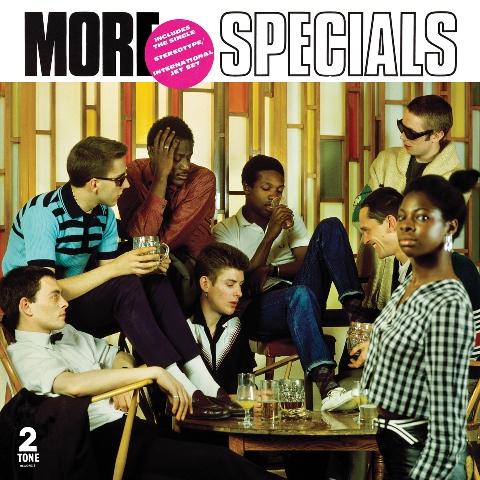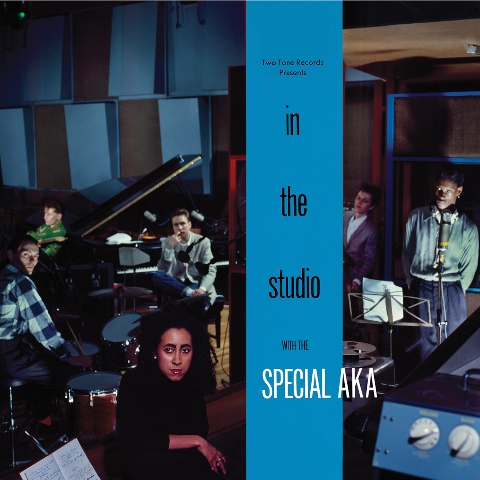Reissue CDs Weekly: The Specials | reviews, news & interviews
Reissue CDs Weekly: The Specials
Reissue CDs Weekly: The Specials
Fragmentation and wilfulness on the three 2 Tone albums by Jerry Dammers and his cohorts

 The Specials: Specials, More Specials; The Special AKA: In the Studio
The Specials: Specials, More Specials; The Special AKA: In the Studio
After hearing the three albums credited to The Specials during their formative period with 2 Tone Records it becomes hard to think of them as a single band. Their clanky sounding, Elvis Costello-produced eponymous debut album, issued in October 1979, just about holds together overall, but its successors now sound as though nothing united the different directions they were firing off in. More Specials (October 1980) sits up-tempo cheerlessness alongside a warping of easy listening. In The Studio (June 1984) comes across as a compilation album of separate bands. In effect it partly was: it included singles issued by different line-ups over the previous two years.
On single, in bite-sized chunks, The Specials were more coherent. The reconfigured ska of 1979’s debut “Gangsters” opened the door to The Special A.K.A. Live! EP, which featured “Too Much too Young”. Amongst the subsequent singles were the epochal “Ghost Town” in 1981, the almost career-killing “The Boiler” and 1984’s “Free Nelson Mandela”. The final single which could be tied to the original configuration of The Specials was 1984’s "What I Like Most About You is Your Girlfriend".
The Specials had fallen apart after "Ghost Town" and More Specials when Lynval Golding, Terry Hall and Neville Staple departed. Jerry Dammers picked up what was left and ploughed on, with In The Studio culminating his efforts. Shortly after that, the name – both as The Specials and Special AKA – was put to bed. Reunions featuring varying amounts of prime-era band members have followed, but Dammers has generally kept these at arm’s length.
 Although the three 2 Tone albums reissued here as double-disc sets chronicle simultaneous fragmentation and attempts to coalesce, they also document wilfulness: both the need to keep going whatever the obstacles and of an artistic vision which stated what needed to be stated without compromise. Depending on musical tastes, any or all of “Too Much too Young”, “Ghost Town”, “The Boiler” and “Free Nelson Mandela” can be taken as high-water marks in music as political and social commentary, where incisive lyrics were married to irresistible music.
Although the three 2 Tone albums reissued here as double-disc sets chronicle simultaneous fragmentation and attempts to coalesce, they also document wilfulness: both the need to keep going whatever the obstacles and of an artistic vision which stated what needed to be stated without compromise. Depending on musical tastes, any or all of “Too Much too Young”, “Ghost Town”, “The Boiler” and “Free Nelson Mandela” can be taken as high-water marks in music as political and social commentary, where incisive lyrics were married to irresistible music.
It didn’t stop there. In the Studio’s “Racist Friend" (also issued as a single) was as adroit. Specials’ “Blank Expression” and “Stupid Marriage” were extraordinarily cutting. “Little Bitch” borders on the terrifying. More Specials opens with a version of “Enjoy Yourself (It's Later Than You Think)” which turns a sardonic slant into an aural sneer. At all times, whatever the line-up, the 2 Tone Specials were about more than the music.
 But when experienced live – documented here on The Special A.K.A. Live! EP and a December 1979 concert appended to the Specials package – The Specials could be enjoyed without any need to appreciate their multi-level approach.
But when experienced live – documented here on The Special A.K.A. Live! EP and a December 1979 concert appended to the Specials package – The Specials could be enjoyed without any need to appreciate their multi-level approach.
More Specials and In the Studio are bulked out on Disc Two with single-only tracks, BBC studio sessions and, on the latter, instrumental backing tracks. These are not all-encompassing reissues: the whole of The Specials 2 Tone catalogue is not collected across the six discs. “Ghost Town”, a non-album single, is heard in its six-minute 12-inch version rather than the familiar seven-inch version. “Why?” is also heard in its extended form. Rather than collecting everything originally issued, these reissues demonstrate the full range of the 2 Tone Specials.
Taken as a whole, Specials, More Specials and In the Studio stress that, in British chart pop, The Specials occupied a space analogous to no other late Seventies or early Eighties band. There are, though, similarities with The Clash, especially the scattershot London Calling Clash. Pointed lyrics were merged with direct music. Yet often the music of The Specials was not direct. Jerry Dammers and his cohorts set themselves apart. No wonder their shelf life was limited.
Share this article
The future of Arts Journalism
You can stop theartsdesk.com closing!
We urgently need financing to survive. Our fundraising drive has thus far raised £49,000 but we need to reach £100,000 or we will be forced to close. Please contribute here: https://gofund.me/c3f6033d
And if you can forward this information to anyone who might assist, we’d be grateful.

Subscribe to theartsdesk.com
Thank you for continuing to read our work on theartsdesk.com. For unlimited access to every article in its entirety, including our archive of more than 15,000 pieces, we're asking for £5 per month or £40 per year. We feel it's a very good deal, and hope you do too.
To take a subscription now simply click here.
And if you're looking for that extra gift for a friend or family member, why not treat them to a theartsdesk.com gift subscription?
more New music
 'The Art of Loving': Olivia Dean's vulnerable and intimate second album
Neo soul Londoner's new release outgrows her debut
'The Art of Loving': Olivia Dean's vulnerable and intimate second album
Neo soul Londoner's new release outgrows her debut
 Music Reissues Weekly: The Peanut Butter Conspiracy - The Most Up Till Now
Definitive box-set celebration of the Sixties California hippie-pop band
Music Reissues Weekly: The Peanut Butter Conspiracy - The Most Up Till Now
Definitive box-set celebration of the Sixties California hippie-pop band
 Doja Cat's 'Vie' starts well but soon tails off
While it contains a few goodies, much of the US star's latest album lacks oomph
Doja Cat's 'Vie' starts well but soon tails off
While it contains a few goodies, much of the US star's latest album lacks oomph
 Mariah Carey is still 'Here for It All' after an eight-year break
Schmaltz aplenty but also stunning musicianship from the enduring diva
Mariah Carey is still 'Here for It All' after an eight-year break
Schmaltz aplenty but also stunning musicianship from the enduring diva
 Album: Solar Eyes - Live Freaky! Die Freaky!
Psychedelic indie dance music with a twinkle in its eye
Album: Solar Eyes - Live Freaky! Die Freaky!
Psychedelic indie dance music with a twinkle in its eye
 Album: Night Tapes - portals//polarities
Estonian-voiced, London-based electro-popsters' debut album marks them as one to watch for
Album: Night Tapes - portals//polarities
Estonian-voiced, London-based electro-popsters' debut album marks them as one to watch for
 Album: Mulatu Astatke - Mulatu Plays Mulatu
An album full of life, coinciding with a 'farewell tour'
Album: Mulatu Astatke - Mulatu Plays Mulatu
An album full of life, coinciding with a 'farewell tour'
 Music Reissues Weekly: Sly and the Family Stone - The First Family: Live At Winchester Cathedral 1967
Must-have, first-ever release of the earliest document of the legendary soul outfit
Music Reissues Weekly: Sly and the Family Stone - The First Family: Live At Winchester Cathedral 1967
Must-have, first-ever release of the earliest document of the legendary soul outfit
 Album: Robert Plant - Saving Grace
Mellow delight from former Zep lead
Album: Robert Plant - Saving Grace
Mellow delight from former Zep lead
 Brìghde Chaimbeul, Round Chapel review - enchantment in East London
Inscrutable purveyor of experimental Celtic music summons creepiness and intensity
Brìghde Chaimbeul, Round Chapel review - enchantment in East London
Inscrutable purveyor of experimental Celtic music summons creepiness and intensity
 Album: NewDad - Altar
The hard-gigging trio yearns for old Ireland – and blasts music biz exploitation
Album: NewDad - Altar
The hard-gigging trio yearns for old Ireland – and blasts music biz exploitation
 First Person: Musician ALA.NI on how thoughts of empire and reparation influenced a song
She usually sings about affairs of the heart - 'TIEF' is different, explains the star
First Person: Musician ALA.NI on how thoughts of empire and reparation influenced a song
She usually sings about affairs of the heart - 'TIEF' is different, explains the star

Add comment